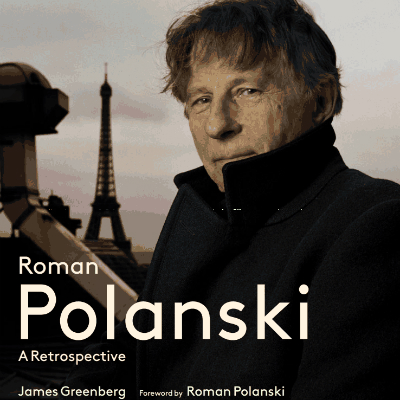Given the highly publicized drama of Roman Polanski's personal life, his superlative work as a filmmaker is sometimes relegated to the back burner. But, far from the tabloids, James Greenberg has written an illuminating and comprehensive film book so lavishly illustrated that the reader is immersed in over 250 full-page images from Polanski's career.

Greenberg, the editor-in-chief of the DGA (Directors Guild of America) Journal, took the occasion of the famed director's 80th birthday (two months ago) to create Roman Polanski, A Retrospective. And if his demeanor at the Cannes Film Festival in May is any indication, Polanski is a spry, feisty 80, and still vital as a filmmaker.
Cannes had selected his Venus in Fur, adapted from David Ives' acclaimed play. Starring Polanski's wife Emmanuelle Seigner, this entertaining adaptation is about -- and contains -- layers of performance, a "theatrical" tour-de-force similar to his previous film, Carnage.
In an interview this week, Greenberg acknowledged "a common misconception that Polanski's work peaked in the '60s and '70s and has been all downhill since then. But one could argue that The Pianist is as good as anything he has done (Polanski considers it his 'tombstone' film).
The Ghost Writer is a beautifully made and satisfying thriller," he continued. "Death and the Maiden is tense, taut and grossly underrated. Oliver Twist may not be a Dickens for the ages, but its attention to detail makes it entertaining and totally credible. None of these films may be as great as Chinatown or Rosemary's Baby, but I think Polanski set the bar so high that even some of his less grand work is still pretty darn good.
New York moviegoers will get the chance to appreciate Polanski's earliest work this week. On Friday at 1:30, Greenberg will introduce the groundbreaking first feature, Knife in the Water (which was reviled in 1962 in his native Poland, but became an international triumph), together with Polanski's short films, Two Men and a Wardrobe, The Fat and the Lean, and Breaking the Party.
And on Saturday at 2 p.m., the California-based author will present Repulsion -- which introduced Catherine Deneuve to film-goers in 1965 -- at the Museum of the Moving Image in Astoria. Both events will be followed by book-signings.
Polanski might have resisted the attention of a journalist, but Greenberg had already earned his confidence more than 20 years ago. "I was invited with several other journalists to observe him shooting exteriors for Bitter Moon aboard an ocean liner going from Venice to Athens," he recalled. "It was an extraordinary week watching this little dynamo at work. If a wire broke on the set, he'd run over and fix it; if the lighting was not right, he would adjust it himself; if someone's tie was crooked, he'd go and straighten it.
He was the complete filmmaker. He had the full equation of film-making -- the technical and the aesthetic -- in his head more than any director I've ever seen before or since. After that, I interviewed him several times over the years. I always found the uniqueness of his best work -- the absurdity and black humor of his worldview -- deeply moving.
When asked how difficult was it to get rights for the abundant illustrations, he replied, "Once I had assured Polanski that the book was going to be only about his work, he was very generous with his time and even allowed me to go through his archives, which I did for a sweltering week last August in Paris. His archives are basically a closet in his office -- not unlike a closet you might have in your house, except these boxes are labeled Chinatown, Rosemary's Baby, Repulsion.
One of the most surprising discoveries I made was in the 'Fearless Vampire Killers' box, where I came upon a contact sheet of Polanski directing Sharon Tate, which opens the chapter on that film in my book. It's just a director working intensely with his actor, but what happened to these people gives it a remarkable poignancy. Other behind-the-scenes photos, many of which I'd never seen before, were tracked down at archives around the world by our photo editor.
Writing this book enabled Greenberg to see Polanski's life and work "all of a piece," as he put it, "from the death of his pregnant mother in a German concentration camp, his survival by hiding with a dirt-poor family in rural Poland, the Communist invasion of his homeland, the death of his pregnant wife Sharon Tate at the hands of the Manson Family, his conviction for raping a 13-year-old girl and his subsequent flight from the US to avoid additional prison time. Perhaps that explains why there is an unmistakable sense of menace and dread in Polanski's oeuvre, and why there is scarcely a happy ending to be found in any of his films."
Now 80, has Polanski mellowed? "All I can say is he seems content. He lives with his wife of twenty-four years and two teenage kids in Paris. I see him as a willful survivor," Greenberg concluded.
_____
Annette Insdorf, Director of Undergraduate Film Studies at Columbia University, is the author of Indelible Shadows: Film and the Holocaust, and Double Lives, Second Chances: The Cinema of Krzysztof Kieslowski, which has just been reissued by Northwestern University Press.
